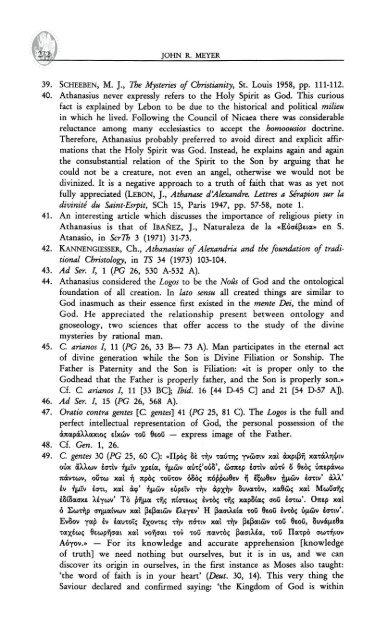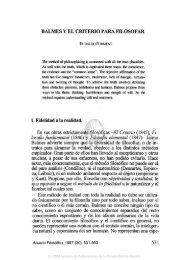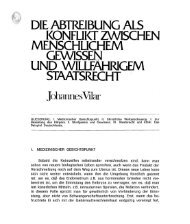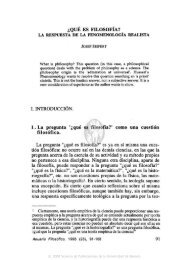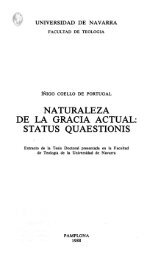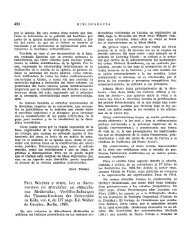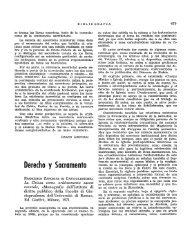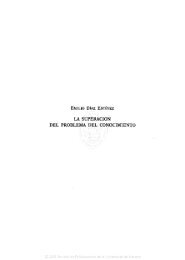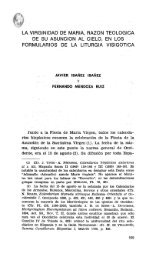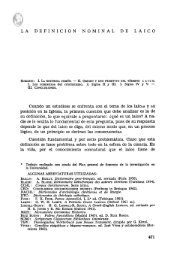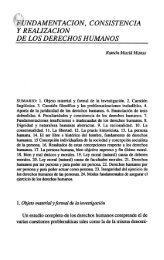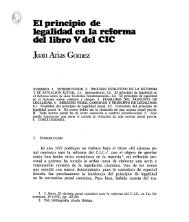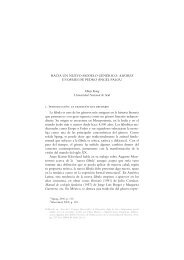the soteriology of saint athanasius of alexandria the conformation of ...
the soteriology of saint athanasius of alexandria the conformation of ...
the soteriology of saint athanasius of alexandria the conformation of ...
You also want an ePaper? Increase the reach of your titles
YUMPU automatically turns print PDFs into web optimized ePapers that Google loves.
272 JOHN R. MEYER<br />
39. SCHEEBEN, M. J., The Mysteries <strong>of</strong> Christianity, St. Louis 1958, pp. 111-112.<br />
40. Athanasius never expressly refers to <strong>the</strong> Holy Spirit as God. This curious<br />
fact is explained by Lebon to be due to <strong>the</strong> historical and political milieu<br />
in which he lived. Following <strong>the</strong> Council <strong>of</strong> Nicaea <strong>the</strong>re was considerable<br />
reluctance among many ecclesiastics to accept <strong>the</strong> homoousios doctrine.<br />
Therefore, Athanasius probably preferred to avoid direct and explicit affirmations<br />
that <strong>the</strong> Holy Spirit was God. Instead, he explains again and again<br />
<strong>the</strong> consubstantial relation <strong>of</strong> <strong>the</strong> Spirit to <strong>the</strong> Son by arguing that he<br />
could not be a creature, not even an angel, o<strong>the</strong>rwise we would not be<br />
divinized. It is a negative approach to a truth <strong>of</strong> faith that was as yet not<br />
fully appreciated (LEBON, J., Athanase d'Alexandre. Lettres a Sérapion sur la<br />
divinité du Saint-Esrpit, SCh 15, Paris 1947, pp. 57-58, note 1.<br />
41. An interesting article which discusses <strong>the</strong> importance <strong>of</strong> religious piety in<br />
Athanasius is that <strong>of</strong> IBANEZ, J., Naturaleza de la «Eùaé(3eia» en S.<br />
Atanasio, in ScrTh 3 (1971) 31-73.<br />
42. KANNENGIESSER, Ch., Athanasius <strong>of</strong> Alexandria and <strong>the</strong> foundation <strong>of</strong> traditional<br />
Christology, in 75 34 (1973) 103-104.<br />
43. Ad Ser. I, 1 (PG 26, 530 A-532 A).<br />
44. Athanasius considered <strong>the</strong> Logos to be <strong>the</strong> Nous <strong>of</strong> God and <strong>the</strong> ontological<br />
foundation <strong>of</strong> all creation. In lato sensu all created things are similar to<br />
God inasmuch as <strong>the</strong>ir essence first existed in <strong>the</strong> mente Dei, <strong>the</strong> mind <strong>of</strong><br />
God. He appreciated <strong>the</strong> relationship present between ontology and<br />
gnoseology, two sciences that <strong>of</strong>fer access to <strong>the</strong> study <strong>of</strong> <strong>the</strong> divine<br />
mysteries by rational man.<br />
45. C. arianos I, 11 (PG 26, 33 B— 73 A). Man participates in <strong>the</strong> eternal act<br />
<strong>of</strong> divine generation while <strong>the</strong> Son is Divine Filiation or Sonship. The<br />
Fa<strong>the</strong>r is Paternity and <strong>the</strong> Son is Filiation: «it is proper only to <strong>the</strong><br />
Godhead that <strong>the</strong> Fa<strong>the</strong>r is properly fa<strong>the</strong>r, and <strong>the</strong> Son is properly son.»<br />
Cf. С. arianos I, 11 [33 ВС]; Ibid. 16 [44 D-45 C] and 21 [54 D-57 A]).<br />
46. Ad Ser. I, 15 (PG 26, 568 A).<br />
47. Oratio contra gentes [C. gentes] 41 (PG 25, 81 C). The Logos is <strong>the</strong> full and<br />
perfect intellectual representation <strong>of</strong> God, <strong>the</strong> personal possession <strong>of</strong> <strong>the</strong><br />
àroxpàXXaxioç eîxtùv той 8БО5 — express image <strong>of</strong> <strong>the</strong> Fa<strong>the</strong>r.<br />
48. Cf. Gen. 1, 26.<br />
49. С. gentes 30 (PG 25, 60 С): «Прос 8è TTJV TOÛTT); fv&aiv xat àxpi(5fi xa%6ifa]fyiv<br />
oùx #XX


